 I have so many things I want to say after this episode of Gegege no Kitarou that it’s hard to know just where to start. That’s a problem I have after an especially stupendous or thought-provoking anime episode, and while it’s a good problem to have, it’s still frustrating. I suppose the first and foremost message must be the simplest – this show is truly great. It continues to top itself, time after time. I sincerely apologize for not giving it its full due soon enough, but I will at the end of the year, believe me.
I have so many things I want to say after this episode of Gegege no Kitarou that it’s hard to know just where to start. That’s a problem I have after an especially stupendous or thought-provoking anime episode, and while it’s a good problem to have, it’s still frustrating. I suppose the first and foremost message must be the simplest – this show is truly great. It continues to top itself, time after time. I sincerely apologize for not giving it its full due soon enough, but I will at the end of the year, believe me.
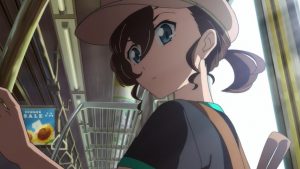 After that, it gets much harder. There’s a lot grinding in there after watching this, as Gegege moved me to tears yet again, yes, but also demanded so much reflection. The truth is, I find this series both hugely restorative and deeply depressing as it pertains to the state of anime. More specifically, anime in the West. It’s a superb production, admirable on every level, a testament to the fact that even at a huge corporate production house works of sensitivity and brilliance can happen if creators care enough (and are talented enough). It shows us that the spirit of anime is very much alive and thriving in 2018.
After that, it gets much harder. There’s a lot grinding in there after watching this, as Gegege moved me to tears yet again, yes, but also demanded so much reflection. The truth is, I find this series both hugely restorative and deeply depressing as it pertains to the state of anime. More specifically, anime in the West. It’s a superb production, admirable on every level, a testament to the fact that even at a huge corporate production house works of sensitivity and brilliance can happen if creators care enough (and are talented enough). It shows us that the spirit of anime is very much alive and thriving in 2018.
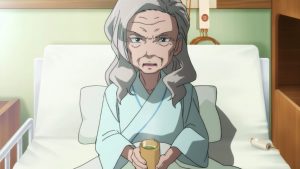 But its reception in the English-speaking fandom is another matter. Japan gets this series – if garners tremendous TV ratings, and based on when it airs it seems likely that many viewers are (almost unbelievably) children. But in Western fandom it may as well not exist, even here (and if not here – where?). Why is that? Much like the world of Mizuki Shigeru’s fiction has lost touch with its roots and the lessons they can teach, there’s no place for shows like this in “anime” as its defined by Western audiences in 2018. And while as a viewer I thank my lucky stars this series exists, as a critic it makes me question what the point of continuing to participate in the discussion is. It’s terrible to have something as wondrous and soul-restoring as this episode make one feel that way, but I can’t deny the reality of my own feelings.
But its reception in the English-speaking fandom is another matter. Japan gets this series – if garners tremendous TV ratings, and based on when it airs it seems likely that many viewers are (almost unbelievably) children. But in Western fandom it may as well not exist, even here (and if not here – where?). Why is that? Much like the world of Mizuki Shigeru’s fiction has lost touch with its roots and the lessons they can teach, there’s no place for shows like this in “anime” as its defined by Western audiences in 2018. And while as a viewer I thank my lucky stars this series exists, as a critic it makes me question what the point of continuing to participate in the discussion is. It’s terrible to have something as wondrous and soul-restoring as this episode make one feel that way, but I can’t deny the reality of my own feelings.
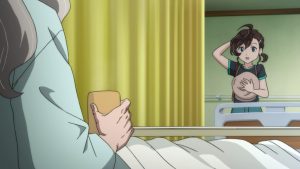 It’s important to reiterate, even if it falls on mostly deaf ears, just how miraculous this series is. It does so many things right: it updates the existing characters in such a way as to make them fresh and modern, while still retaining their essential selves. In Mana, it offers a superb bridge to modern young people – a great character design and a flawed but essentially noble child full of curiosity and selfishness, the way children are. And this series is totally, 100% loyal to the vision and spirit of Mizuki’s works – never more so than with this episode.
It’s important to reiterate, even if it falls on mostly deaf ears, just how miraculous this series is. It does so many things right: it updates the existing characters in such a way as to make them fresh and modern, while still retaining their essential selves. In Mana, it offers a superb bridge to modern young people – a great character design and a flawed but essentially noble child full of curiosity and selfishness, the way children are. And this series is totally, 100% loyal to the vision and spirit of Mizuki’s works – never more so than with this episode.
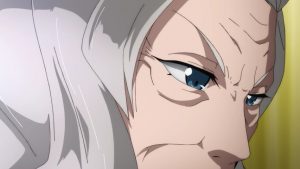 The storyline here finds a way to combine two of Mizuki’s most prized themes – the horrors of war, and the preservation of nature. When Mizuki-sensei wrote about war, he knew what he was talking about – he served in the Japanese army. He fought on Papua New Guinea. He lost countless friends and comrades, and his left arm. He came home, learned to draw right-handed and eventually, was forced by the government to write stories that glorified the war. His desperation to circumvent that command drove much of his early writings, taught him how to subtly suggest things that his dim-witted censors wouldn’t spot.
The storyline here finds a way to combine two of Mizuki’s most prized themes – the horrors of war, and the preservation of nature. When Mizuki-sensei wrote about war, he knew what he was talking about – he served in the Japanese army. He fought on Papua New Guinea. He lost countless friends and comrades, and his left arm. He came home, learned to draw right-handed and eventually, was forced by the government to write stories that glorified the war. His desperation to circumvent that command drove much of his early writings, taught him how to subtly suggest things that his dim-witted censors wouldn’t spot.
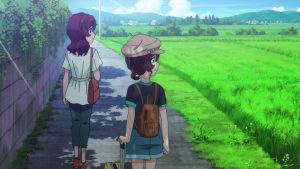 I can only imagine that if Mizuki were alive today, he’d be horrified by what was happening in Japan. A nationalist government trying to change the pacifist constitution written in response to the horror of Japan’s role in World War II, a drive to “cleanse” school textbooks to glorify Japan’s role in the war. I think it’s an unavoidable conclusion that the anime staff at Toei saw this story as a way to honor what Mizuki would be doing if he were alive today – everything in his power to make sure today’s children don’t forget. Mana’s ignorance about the war is not sinister or an indictment of her character – she’s a child, and the war happened a very long time ago. She knows what she’s taught (if she was paying attention) but no more. But now more than ever, kids like Mana need to have an appreciation for the horrors visited on the world back then – what soldiers on all sides of the conflict suffered through.
I can only imagine that if Mizuki were alive today, he’d be horrified by what was happening in Japan. A nationalist government trying to change the pacifist constitution written in response to the horror of Japan’s role in World War II, a drive to “cleanse” school textbooks to glorify Japan’s role in the war. I think it’s an unavoidable conclusion that the anime staff at Toei saw this story as a way to honor what Mizuki would be doing if he were alive today – everything in his power to make sure today’s children don’t forget. Mana’s ignorance about the war is not sinister or an indictment of her character – she’s a child, and the war happened a very long time ago. She knows what she’s taught (if she was paying attention) but no more. But now more than ever, kids like Mana need to have an appreciation for the horrors visited on the world back then – what soldiers on all sides of the conflict suffered through.
 The story depicted in this episode is not, as far as I know, one written by Mizuki – if it is, I can find no evidence of it. But that just makes it all the more remarkable, because it exemplifies everything this version of Gegege no Kitarou stands for and what makes it great. Mana’s great-aunt Toshiko (Takashima Gara, yet another seiyuu who appeared in earlier versions of this series) has collapsed. She’s a black sheep, and Mana’s mother (I love how this series uses Mana’s entire family as a way to explore fascinating story ideas) is the only one close to her. The old woman announces she’s ready to die, but expresses concern for the flowers at her house – mysterious red blossoms not found in any textbook which appear every year around Obon time.
The story depicted in this episode is not, as far as I know, one written by Mizuki – if it is, I can find no evidence of it. But that just makes it all the more remarkable, because it exemplifies everything this version of Gegege no Kitarou stands for and what makes it great. Mana’s great-aunt Toshiko (Takashima Gara, yet another seiyuu who appeared in earlier versions of this series) has collapsed. She’s a black sheep, and Mana’s mother (I love how this series uses Mana’s entire family as a way to explore fascinating story ideas) is the only one close to her. The old woman announces she’s ready to die, but expresses concern for the flowers at her house – mysterious red blossoms not found in any textbook which appear every year around Obon time.
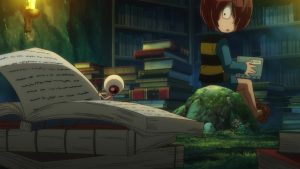 What a beautiful notion this is – a way to connect the heart and history, the personal with the global. The Tubuan spirits we see when the story journeys to Papua New Guinea in search of the Yoka flowers’ source (on a “clam boat” steered by Kawauso – because characters are never thrown away in this series) – are very much a Mizuki-inspired addition. Deities of the local Torai people (who Mizuki befriended during the war), Mizuki drew many pictures of the Tubuan and even claimed to have seen them in the forests on Papua New Guinea. Here, they’re protecting a sacred tree beneath which lie the remains of countless Japanese soldiers – including Soujiro, the man who Toshiko was in love with and whose disappearance led to her life of solitude and loneliness. With the tree threatened by (Japanese) loggers, his spirit sent out a final message to try and reach her.
What a beautiful notion this is – a way to connect the heart and history, the personal with the global. The Tubuan spirits we see when the story journeys to Papua New Guinea in search of the Yoka flowers’ source (on a “clam boat” steered by Kawauso – because characters are never thrown away in this series) – are very much a Mizuki-inspired addition. Deities of the local Torai people (who Mizuki befriended during the war), Mizuki drew many pictures of the Tubuan and even claimed to have seen them in the forests on Papua New Guinea. Here, they’re protecting a sacred tree beneath which lie the remains of countless Japanese soldiers – including Soujiro, the man who Toshiko was in love with and whose disappearance led to her life of solitude and loneliness. With the tree threatened by (Japanese) loggers, his spirit sent out a final message to try and reach her.
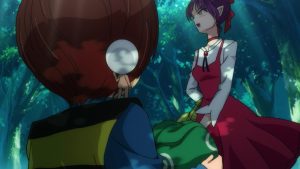 The youkai of Gegege forest know what happened during the war – because they remember (including Nezumi-otoko, who again proves very useful here and clearly has a soft spot for Mana). But Mana doesn’t know – she can’t know, because she hasn’t been told. Learning Soujiro and Toshiko’s story connects Mana to the truth in a way both beautiful and terrible, and she returns home determined not just that Toshiko should know the truth of what happened, but that her classmates should too – that they not be ignorant to history. That ignorance carries a steep price – Mizuki-sensei knew this, and that knowledge was the driving force behind his decision to become a writer.
The youkai of Gegege forest know what happened during the war – because they remember (including Nezumi-otoko, who again proves very useful here and clearly has a soft spot for Mana). But Mana doesn’t know – she can’t know, because she hasn’t been told. Learning Soujiro and Toshiko’s story connects Mana to the truth in a way both beautiful and terrible, and she returns home determined not just that Toshiko should know the truth of what happened, but that her classmates should too – that they not be ignorant to history. That ignorance carries a steep price – Mizuki-sensei knew this, and that knowledge was the driving force behind his decision to become a writer.
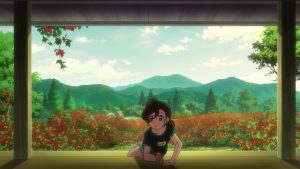 Honestly, the superlatives just don’t come fast or deep enough. To achieve so much both as entertainment and messenger – that’s the miracle of Gegege no Kitarou 2018. Even as Mana carries her message back to her classmates in middle school, children all over Japan watch this episode and are forced to consider, at least a little, what their history teachers and textbooks may not be telling them. I can only imagine that as much as he would be horrified by much of what’s happening in Japan today as regards its history, Mizuki Shigeru would be gratified to know that his work was being used to fight against ignorance and hatred. And I can think of no better way that the creators behind this show could honor his life – though they’ve already spent the past 20 episodes doing so in glorious fashion.
Honestly, the superlatives just don’t come fast or deep enough. To achieve so much both as entertainment and messenger – that’s the miracle of Gegege no Kitarou 2018. Even as Mana carries her message back to her classmates in middle school, children all over Japan watch this episode and are forced to consider, at least a little, what their history teachers and textbooks may not be telling them. I can only imagine that as much as he would be horrified by much of what’s happening in Japan today as regards its history, Mizuki Shigeru would be gratified to know that his work was being used to fight against ignorance and hatred. And I can think of no better way that the creators behind this show could honor his life – though they’ve already spent the past 20 episodes doing so in glorious fashion.


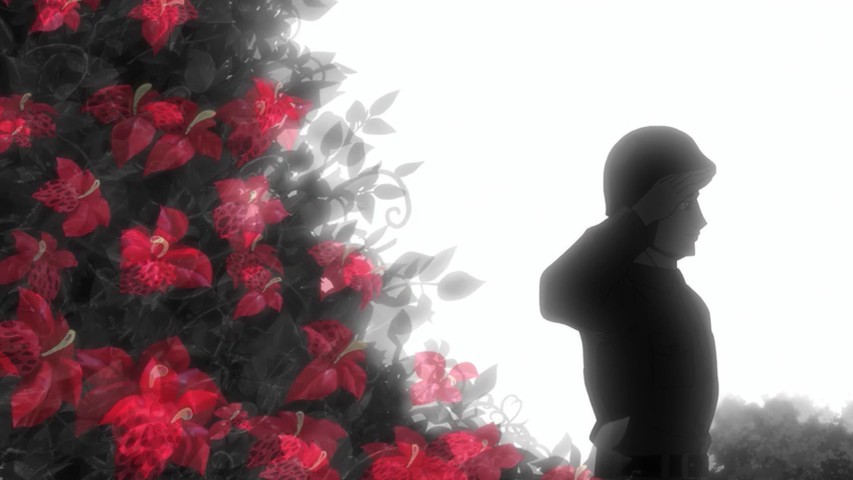
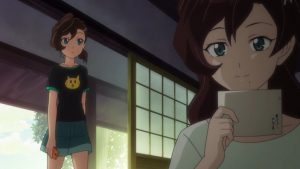
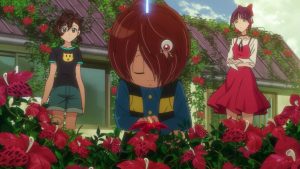
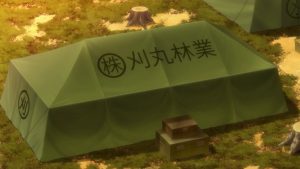
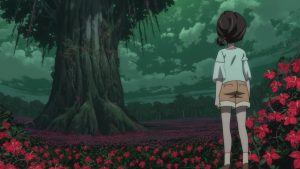
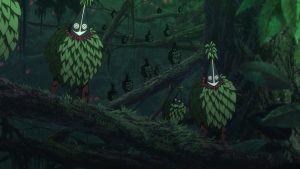
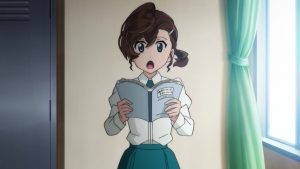

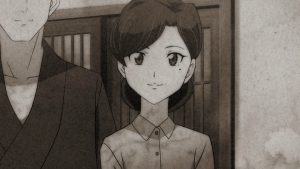
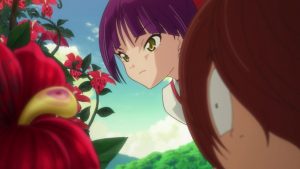
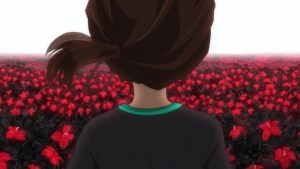

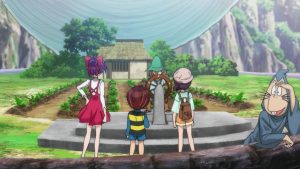
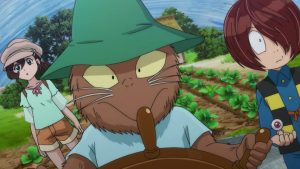
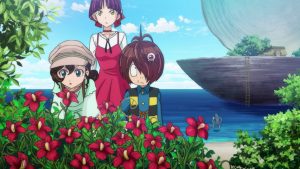
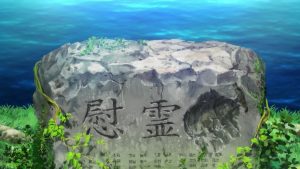
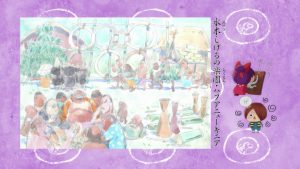
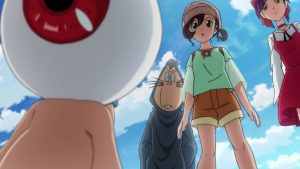
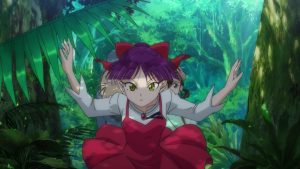
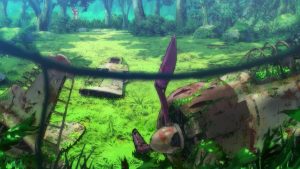
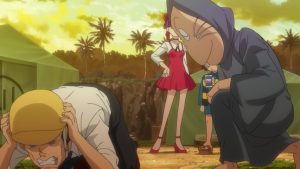
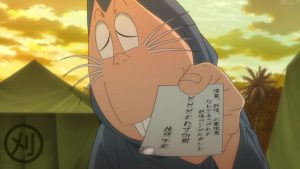
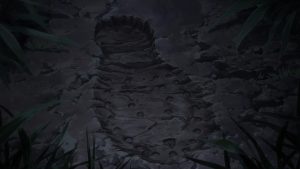
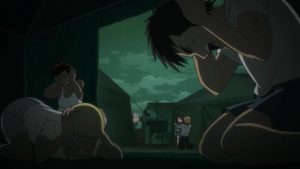
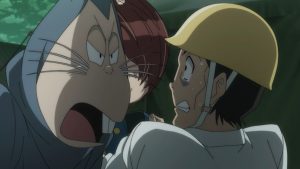

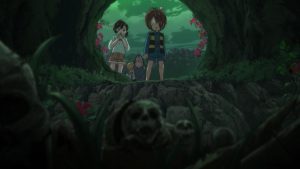
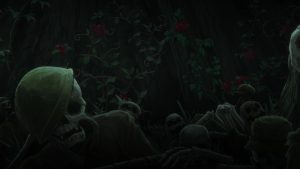
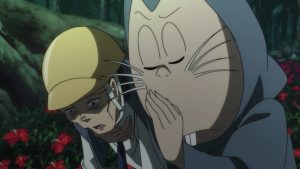
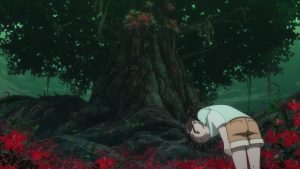
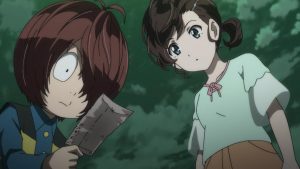
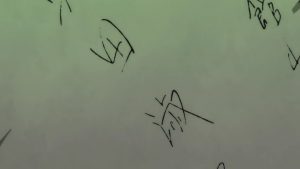
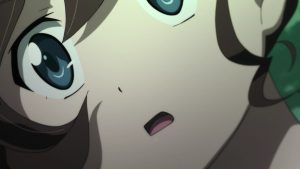
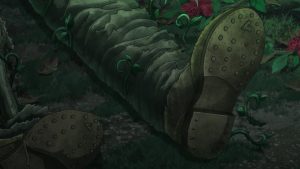
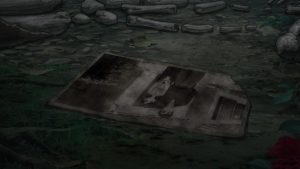
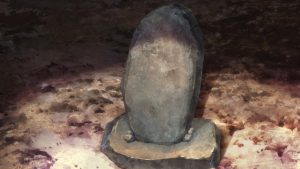
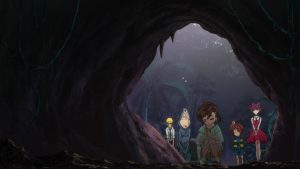
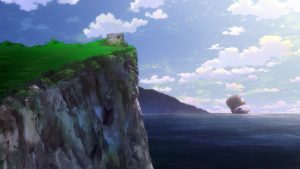
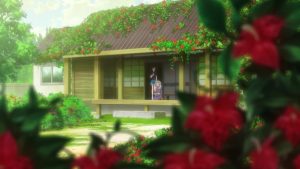
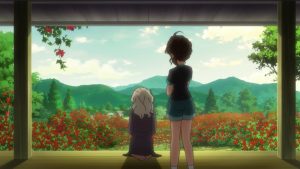
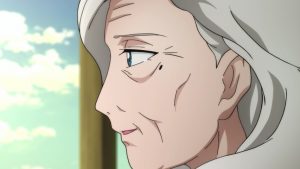




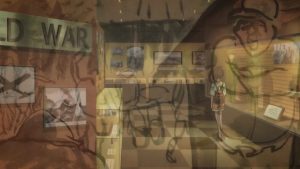

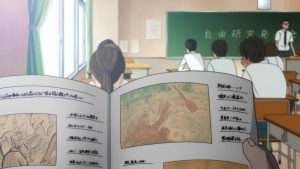
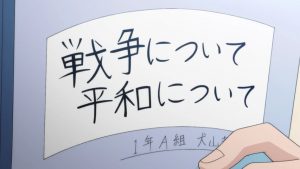
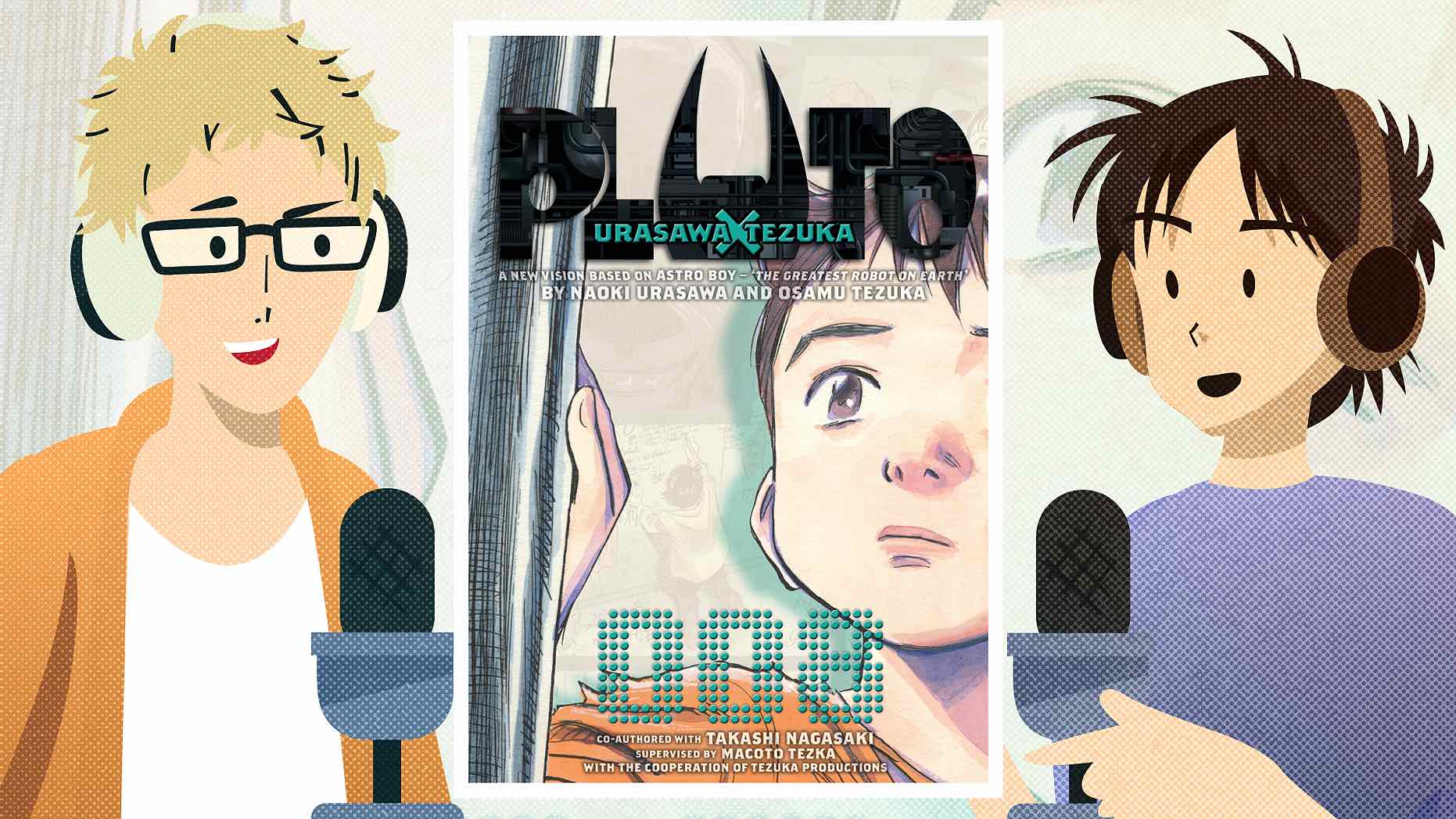
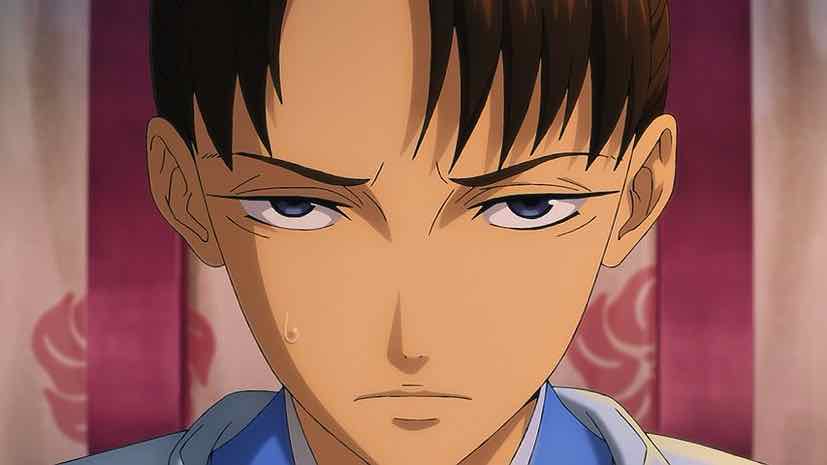
Collectr
August 12, 2018 at 5:15 amI’ve said this before, but it bears repeating: please don’t confuse silence (in the comments section) with indifference. Comments are a poor way of measuring interest. With viewers using live streaming, torrent downloads, direct downloads, IRC bot downloads, etc to obtain anime., it’s impossible to measure how many English-speaking viewers are watching. GeGeGe has found its audience, or vice versa.
While it’s not common, good anime sometimes has veiled social criticism (like in Un-Go or One Punch Man). Anime used to be more fearless – the 1996 OVA Sanctuary was a blistering indictment of the political order. Still, I’m glad that critical attitudes haven’t died out completely, despite the political climate there (and here).
Guardian Enzo
August 12, 2018 at 6:08 amAlmost universal silence – coupled with comically low aggregator scores – are very strong circumstantial evidence that a series has little following. Especially when, like this one, it offers off themes pretty much weekly that would be grist for the conversational mill if people were watching.
Deluxe
August 12, 2018 at 6:52 amI’m gonna pick up this show eventually since I’ve always been curious about the works of Shigeru Mizuki anyway, but there’s no need to be overdramatic about the supposed state of the Western anime fandom because of this show in particular. Kitaro has been out for fifty years, it has never made it big in the West for various reasons and it’s not gonna do it now regardless of the quality. That doesn’t mean people would loathe it is they watched it, probably the contrary, they just don’t know about it since it’s presented as a kid show.
If you desperatly want Kitaro to get recognition in the West (and you should ask why you desperately need it, this franchise isn’t going anywhere) you could ask for this franchise to get the Lupin the Third or Devilman treatment where a controversial and outlandish director gets his/her hands on it and completly skew the point of the series to fit his/her own style. But that’s probably not what you are asking for.
TheYepMan
August 12, 2018 at 12:13 pmI think you misunderstand Enzo’s feelings. I don’t know if I understand them myself, but I think in a similar way to him.
That thing you mention, about an “auteur” director getting their hands on a franchise and skewing it out of proportion to fit their aesthetic (and the audience that falls for the sham because the aesthetic is either en vogue, or inversely falling out of style and would be sorely missed)… is something I’m very annoyed with anime right now. I despise Devilman Crybaby. DESPISE. It’s a strong word, and I use it for a reason.
I’m very, very much annoyed at the state of anime right now. Ever since Flip Flappers entered the scene and I was very annoyed about how much style and soul it had, but how I couldn’t recommend it to anyone without getting everyone raising an eyebrow in my direction. Ever since A Woman Named Fujiko Mine came around, wrapped from head to toe in “if we want to make it mature, we need cheap titillation”. Ever since I saw the kickstarter for the OVA (Under the Dog) that left me cold and bored out of my skull, to later see the same people releasing a full anime series this time, with the same style and animation flair, but equally mediocre and leaving me cold and bored out of my skull (Sirius the Jaeger). Ever since Studio Trigger came around and I saw everyone (and still see everyone) worshipping them and claiming them the sole saviors of anime when their entire catalog is trash save for a show that, let’s face it, is mediocre at best (LWA). And now, with not one but TWO FLCL projects that no one asked for, have nothing to justify their existence, and are treated as a joke even by the people who commissioned them (see Adult Swim’s April Fools joke).
I’m sick of the anime industry. I’m sick of the anime audience. I’m sick of looking for shows like this one and finding… mostly just this one, and knowing that at least this time I can thank Japanese audiences and their idiosyncrasies for letting this exist and flourish (when most of the time I’m cursing them for being obsessed about sexualized idols and fascist tract disguised as “a fun action show”) because I’m never, ever gonna find anyone near me physically that even knows this is airing, or cares.
Call it selfishness, and trying to push my own aesthetic/narrative preference on people. I don’t care. I crave something I can truly feel fulfilled, even proud for liking. It pains me to see people pick up a bunch of “sleepers” that don’t interest me in the least or that I end up dropping because they’re mediocre and wastes of time (not Planet With. I’m loving Planet With, I’ve come around to it, I’m fucking stoked and screw the haters). And I know I’m still a bit basic, I watch Hero Aca like everyone else and their grandmother but damn. Damn. I want more sensible, sensitive, sincere shows. I don’t want shit made for easy recognition here in the West. I’m overreacting but that’s just how strongly I feel and I can’t help it.
Deluxe
August 12, 2018 at 12:39 pmForgive me if I am a bit harsh with you but your posts reeks of the “Stop liking what I don’t like” kind of mentality which doesn’t add anything to the discussion and certainly doesn’t help the shows you like being recognized because what people hate the most is being patronized about their entertainment.
My small issue with Enzo is how he looks at every single show with the lense of “What does/should the Western audience feel about this” when it doesn’t matter, especially when talking about a show like Kitaro which is a staple of manga and anime for fifty bloody years. Who cares about the reception of a show like this in the West ? What does it have to do with the “state of anime” ? I’m pretty sure the people who make anime don’t think much about that, so I don’t see why we should.
TheYepMan
August 12, 2018 at 1:08 pmWithout wanting to turn this into a feud, I think you misunderstand my feelings as well. You might have read too many comment section posts (oh the irony – we’re in one!).
There’s a line between saying “goddammit, I wish more shows that cater to me were released” and saying “goddammit I wish people would stop liking X and liked Y instead”. I’m gonna slap myself in the face right here and now, and admit I’m riding that line, especially regarding my comments about the works of Studio Trigger, and the passing comment about how we’re saturated with idol shows and edgy action shows with a tinge of fringe politics added to the mix (Attack on Titan? Drifters? et al) because it’s what sells. Does it read patronizing? Yeah, silly me. Was it my intention? Not in the least; if I could have my cake, and eat it, and everyone else could have their cake and eat it, I’d be more than pleased.
But I can’t deny my feelings. Am I the one who’s out of touch? And if so, do I need to feel compelled to desensitize myself to my dislike (or even discomfort) with shows that don’t appeal to me or go against my aesthetic (among other things)? Do I have less right to complain because my tastes aren’t the mainstream?
I know I’m being unreasonable. I know saying this will do absolutely nothing to change the industry. I… might have to become more self-conscious about where and with whom I vent abut these things. But it’s never my intention to chastise people over what they like, and if that’s how I end up sounding, then I guess I have to apologize. Its just the way I feel. It’s frustration over things I have 0 control over.
Guardian Enzo
August 12, 2018 at 4:39 pmWhen you respond to someone (TheYepMan) with quotation marks around what they supposedly said, what you’re quoting should be exactly what they actually said. And Deluxe said none of the things you have in quotation marks. That’s just misrepresentation.
The issue, if you actually read my post, was with the arena of anime commentary in English. And in that context, what’s successful and what’s ignored most certainly does matter. My point was that if the viewership has evolved to the point where a series like this comes along and is totally ignored (and generally panned by those that bothered to watch an episode or two) is there a valid reason to continue being part of the commentary? Based on what’s commercially viable these days, very few series of genuine ambition or creative inspiration are produced to begin with. If no one cares about the ones that are what, frankly, is the point?
The reaction to Planet With is another good example of this problem – though there, at least, you do have people talking about it (even if it’s mostly people who dislike it personally attacking those that do for being relics).
Deluxe
August 12, 2018 at 1:44 pmYou are of course entitled to your feelings and opinions and you can express them however you see fit. Nonetheless it is difficult to start a meaningful conversation with over-generalizations such as “everyone loves Trigger” or “everyone falls for the Devilman sham” when it just looks like you are antagonizing anyone who doesn’t specifically agree with your own views. Just like Enzo talks about the “Western audience” as some sort of homogeneous, monolithic entity which he is so proud of not being part of.
I am personally a huge fan of The Woman called Fujiko Mine which got me into the Lupin franchise, but I do think Trigger is overrated. Am I part of the “everyone” you are so annoyed about ? Am I on your side ? Or maybe thinking about “sides” and “mainstream vs. me” is not the healthiest way to enjoy your hobby. I will leave it at that and hope you have a nice day.
Deluxe
August 12, 2018 at 5:54 pmIf it is about your work as a commentator then I do understand where you are coming from Enzo. Putting up time and effort on a weekly basis to write quality content about shows that you feel nobody is really aware of can be very taxing on the soul, I experienced such things myself. It just felt like sometimes that you were seeking for validation of your tastes, which is something else entierly.
Thanks for this clarification and good luck for the rest of your coverage of Kitaro.
Guardian Enzo
August 12, 2018 at 9:45 pmWell, I don’t know how much more clearly I can state the issue for me thank how I did it in the review – “as a viewer I thank my lucky stars this series exists, as a critic it makes me question what the point of continuing to participate in the discussion is.”
Some people say things like this are cyclical, but I don’t think we’re ever going back – this is where anime fandom is now, and it’s not going to change. So either I have to adapt to it or not, really.
The wild guesser
August 12, 2018 at 7:07 amI highly underestimated this show when it first came out, but episodes like these blow my mind.
Guardian Enzo
August 12, 2018 at 7:39 amMe too. The worst part is, in doing so i was really underestimating Mizuki too, since all this social commentary really comes from him. I knew how good a writer he was but I let my perceptions of GGGnK be shaded over time by the way it’s perceived in the West. And I guess it’s been so long since the last version that I’d forgotten just how much this franchise has to offer.
Dop
August 12, 2018 at 9:49 amThis series has had some very insightful episodes, but this one just blew me away (and I’d recently read Mizuki’s “Onward Towards Our Noble Deaths”) with just how well it put its exceptionally valid and worthwhile message across.
DP
August 12, 2018 at 12:29 pmI started watching this series a couple of days ago based largely on your enthusiasm for it. I’ve only seen a few episodes so far, but I just wanted to chime in and say your proselytizing doesn’t always fall on deaf ears! It’s a really great show, and I hope to catch up over the course of the next week or two.
Guardian Enzo
August 12, 2018 at 4:30 pmJust wait till you get to the really good episodes – it starts well, but the build is gradual.
Flower
August 12, 2018 at 7:29 pm“I highly underestimated this show when it first came out….”
Ayup … number me among those who did the same.
For me my enjoyment of this series is one that is happily and surprisingly a good one (though not great overall) on the whole while it is peppered with downright excellent individual eps (like this one).
I am also continuing to watch it, for what it is worth?
Simone
August 13, 2018 at 2:57 amPersonally I need to pick back up the show, but the real reason IMHO why it doesn’t have that much of a following is a very simple one: it’s a slow burner. It replaced DB Super in its time slot and it immediately presented itself as a children’s show. It’s not that I didn’t feel it was good; I just didn’t feel like it held my attention. Some things can be very good but still not for us. Today we have a lot of tendency towards things that work “for all ages”, with something for children and something for their parents, but you can also have stuff that’s purely for children – aimed squarely at being edifying and educational – and it’s not a bad thing at all, but it’s not surprising that it will also not necessarily hold an adult’s attention, even compared with something of lower quality but that will keep them on edge or make them laugh.
I don’t see really a problem with that – you can have good quality anime that still works for more adult audiences too (hello Planet With! Hi Starlight Revue!). I get why the political landscape in Japan – well, really, in the world as a whole – is bleak right now, but that doesn’t mean that we should interpret everything in that key.
Guardian Enzo
August 13, 2018 at 3:26 amWith all due respect, I think over the course of 20 episodes this has presented itself as anything but a children’s show. Yes, I know it’s a family time slot (where it gets about the same ratings as DBS), so presumably children are watching it. But it doesn’t in any overt sense cater specifically to kids the way, say, Wakaokami does. At least in my opinion. Thematically and in terms of humor. this is “all ages” at the very least, and a lot of the content seems to be very directly targeted at adults.
Simone
August 13, 2018 at 3:50 amI meant more that’s how it *presented* itself. I need to watch further of course to realise if I’d still feel that way, but the first two-three episodes felt good but remarkably target at children. It’s not surprising that people assessed it and dropped it – especially considering that Kitaro might be a big nostalgia-rousing name in Japan, but doesn’t quite mean as much to people in the West. Even if it was a show with a few standout episodes and a lot that are more like those first ones, I guess I’d be more interested in watching only those few and skip the rest (considering that it’s episodic anyway) than the whole thing.
Spencer
August 13, 2018 at 6:57 amWhy is it so important that the English-speaking fandom appreciate this series? If it moved you, treasure that experience. Tell your readers about it – I’ll certainly be checking it out based on the overflowing praise here. But don’t bemoan the habits of western anime consumers as though their interests ought to reflect yours. Everybody has their own thing going.
Nayrael
August 13, 2018 at 10:06 am“Why is that? Much like the world of Mizuki Shigeru’s fiction has lost touch with its roots and the lessons they can teach, there’s no place for shows like this in “anime” as its defined by Western audiences in 2018. ”
Bigger issue is that Gegege is a famous and old franchise in Japan, while in the West nobody knows about it. It’s also very Japanese and expects you to be intimate with Japanese culture and mythos, which majority of western watchers, for obvious reasons, aren’t. That it’s MC looks like someone from a children cartoon and that the franchise is known for children cartoons doesn’t help either. That it has warm episodes doesn’t matter, those never sold any show to the masses.
Also, a show becomes successful if it catches the viewers in the first two eps. If it fails to do so, it’ll be ignored. Most people won’t know if it is good in the long run or if it improves as most people don’t follow blogs and whatnot.
All things considered, it would be strange if it were famous outside Japan.
Stefan
August 13, 2018 at 12:24 pmI don’t know why but this smells like a retroactive justification to me… I think those factors explain why it never took off only if we account for luck, first. When did this series first debut, in the West? I think it lacked that initial streak of luck (the general impression of it being a kiddie show may have cut some of its momentum) and then didn’t catch on by failing to preferentially attach while other shows succeeded doing so.
Jon
August 13, 2018 at 11:09 pmWell, Enzo, as long as you keep writing episodic posts like this, I’m sure many people will give the series a try. Your posts seem to take a different tenor when the show is something you believe in, and most of your readers would detect this and pay special attention.
That said, I like how the sudden bloom of red flowers would have been meaningless without a knowledge of history. Mana’s mom is representative of the average response, an idle sort of curiosity that leads nowhere. Only by confronting history like Mana did could we all learn about the important things.
I also like how Mana’s previous experience with youkai gave her the courage to confront the ghost pursuing her. When Mana had the idea to say ‘Beto-beto-san, please go on ahead’ to the ghost, she establishes an emotional connection with it despite being mistaken. She is able to empathize with an invisible Other despite having no means of communication, and guess what it wants (her to learn about the sacred tree). Any Japanese logger in her shoes would have merely ran away instead.
Perhaps that was Mizuki Shigeru’s greatest wish for his viewers, that appreciation for youkai folktales would eventually lead to an appreciation for history. Kudos to the directors for reinterpreting him in such a moving manner.
Rita
August 15, 2018 at 3:53 pmThere is one interesting thing that I kind of started thinking of retroactively while reading your review. I don’t have as much knowledge about mizuki shigeru’s history (other than briefly skimming the wiki out of curiosity) but it does strike me that, given that he had to deal with getting around censors for his own work, it’s interesting to think about the fact that this episode aired as is. I doubt you’ll hit war paranoia levels of censorships outside of war times, but given that flaw scrubbing in history is a topic that comes up (in both Japan and America, see the attempts to scrub out the history of slavery in some US textbooks). Granted censorship in anime is severely whacky. You can get away with gore, nudity and all sorts of stuff but if you have like, a god damn Korean dish or something prepare to put out a public apology because of backlash (that was by far the most baffling upset of Sakurasou no Pet too me)
Yann
August 22, 2018 at 8:37 pmTo be fair, this show looks like a kid show if you don’t know anything about it, with its character design and even the intro’s music… If I wasn’t such a sucker for yokais, I would probably not have checked it out. There’s definitely more of a “animation is for kids” tradition in the west I feel and is new surprised if it didn’t have anything to do with it…